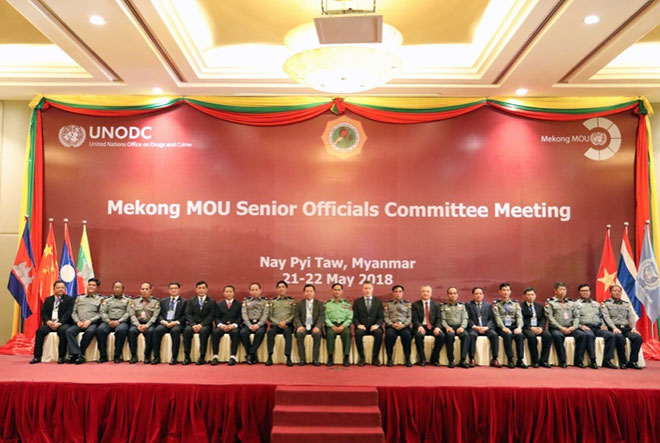Mekong sub-regional countries enhance cooperation on drug control
- People’s Police Academy provides Hanoi’s students with knowledge of drugs
- Vietnam and Myanmar promote cooperation in drug combat
- Fierce combat against drug-related crimes in Muong Cha border district
Senior officials of the Mekong Sub-region countries gathered in Myanmar’s capital city of Nay Pyi Taw on May 21 to review the implementation of the Memorandum of Understanding (MoU) on drug prevention and fighting signed by the countries in the past and discuss new action plans.
 |
| Heads of delegations and organizations participating in the event. |
The event saw the presence of leaders of drug prevention and fighting bodies of the Mekong sub-region countries, namely Cambodia, China, Laos, Myanmar, Thailand and Vietnam. It also drew representatives from the United Nation Office on Drugs and Crime and over 100 delegates and experts from various countries and international organizations.
The Vietnamese delegation participating in the event was led by Lieutenant General Dong Dai Loc, Deputy Director of the General Department of Police.
According to reports at the event, the Mekong sub-region has been known for years as a world hub of illegal drug manufacturing and trade. Thanks to the supports from the international community and with great efforts, involved forces of regional countries have controlled the manufacturing of opium and heroin in recent years.
The illegal production and trade of Methamphetamine in pills or crystalline form, however, witnessed an alarming increase. Only in the first months of 2018, some Mekong sub-region countries caught an amount of Methamphetamine of various kinds larger than in 2017.
Meanwhile, a good deal of Methamphetamine seized in Australia, Japan, New Zealand, Malaysia and Indonesia was identified to originate from the Golden Triangle (in the Greater Mekong Sub-region).
Delegates at the event focused on reviewing and evaluating updated data and information about on the current situation of drug crimes in the region, and discussed in detail various law enforcement strategies and action programs in preventing and fighting drug-related crimes as well as juridical and medical and development issues to support communities in an effort to create alternatives for drug manufacturing in the areas.
They also reviewed results of the implementation of the MoU signed by the member countries, based on which they mapped out a new cooperation strategy and plans to prevent and combat drug-related crimes in the region.

